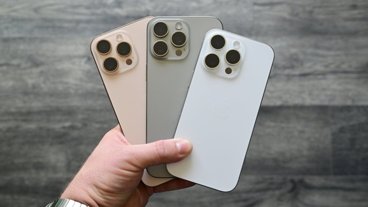The reasoning behind the ruling was discovered in public court documents that were not properly redacted. A report by Reuters notes that its journalists obtained a copy of the court filings before they were edited to block certain details as intended by the court.
Justice Koh's 65 page decision that denied Apple a preliminary injunction against Samsung's sales of Galaxy smartphones and tablets in the US included mention of studies by Apple that "show that existing customers are unlikely to switch from iPhones to Samsung devices."
The report noted that "Instead, the evidence suggests an increase in sales of Samsung smartphones is likely to come at the expense of other smartphones with Android operating systems," making continued sales by Samsung leading up to a final determination on patent infringement a less significant threat to Apple, in the judge's opinion.
Samsung: counterfeits ok if Apple can't make enough originals
The judge also mentioned Samsung's argument, which stated that were Samsung's sales to be blocked, Apple would not be able to keep up with the demand for smartphones in the market. However, Koh regarded the argument as "dubious," in the face of evidence by Apple portraying itself as capable of keeping up with demand.
The heavily redacted decision also included mention of Apple licensing its scrolling patents to Nokia and IBM, and attempting to license the patent to Samsung, actions that were not publicly advertised by any of the parties previously.
Apple and Nokia entered into a secret agreement to resolve their patent issues, but publicly that decision was portrayed only as Apple paying Nokia to license its mostly FRAND licensed, standards related intellectual property. There was no mention of Apple giving Nokia any rights to use its patents unique to the iPhone.
Apple on the offense
While Samsung sells relatively very few tablets, Apple has targeted it as a primary violator of its iPhone and iPad patents due to the egregious nature of its "slavishly" copying Apple's designs, likely in hopes to prevent other makers from also using its designs as blueprints to copy.
Apple's internal studies demonstrating the low relative threat of Samsung's devices appear to have been proven accurate by the lack of any significant tablet sales by Samsung, or by similar devices from Motorola, RIM and HP this year. Apple has similarly brushed off the threat of Amazon's Kindle Fire, with its executives remaining confident that Fire sales would help attract attention to the iPad.
On the other hand, analysts note that Amazon's low cost Kindle Fire will likely engulf at least half of all Android tablet sales next year, making it even more difficult for other Android-based tablets and other potential iPad competitors to gain any traction.
 Daniel Eran Dilger
Daniel Eran Dilger






-m.jpg)






 Charles Martin
Charles Martin
 Wesley Hilliard
Wesley Hilliard
 Stephen Silver
Stephen Silver
 William Gallagher
William Gallagher

 Marko Zivkovic
Marko Zivkovic
 Andrew Orr
Andrew Orr
 Amber Neely
Amber Neely









176 Comments
So the judge is saying "The other guy's product sucks, what are you worried about"?
Apple and Nokia entered into a secret agreement to resolve their patent issues, but publicly that decision was portrayed only as Apple paying Nokia to license its mostly FRAND licensed, standards related intellectual property. There was no mention of Apple giving Nokia any rights to use its patents unique to the iPhone.
Huh? You didn't read the Apple statement to the press where Apple said that Nokia will have a license to some technology, ?but not the majority of the innovations that make the iPhone unique.?? That means some technology that makes the iPhone unique was licensed, otherwise Apple wouldn't have mentioned it, nor worded it the way they did.
http://www.bloomberg.com/news/2011-0...itigation.html
So the judge is saying "The other guy's product sucks, what are you worried about"?
Koh used Apple's own studies (submitted by Apple themselves I presume) that Samsung presented little market danger to Apple.
I'm not a lawyer but if I understand this right, Apple loses the injunction to stop sales in the US but it can still win at trial?
In her decision not to grant Apple a preliminary injunction against Samsung, US judge Lucy Koh stated that her decision was grounded in part on the fact that Samsung's sales were unlikely to tempt Apple's customers and instead come at the expense of other Android makers.
Wow, just think what an enterprising PR / marketing firm could do with this judge's "endorsement".